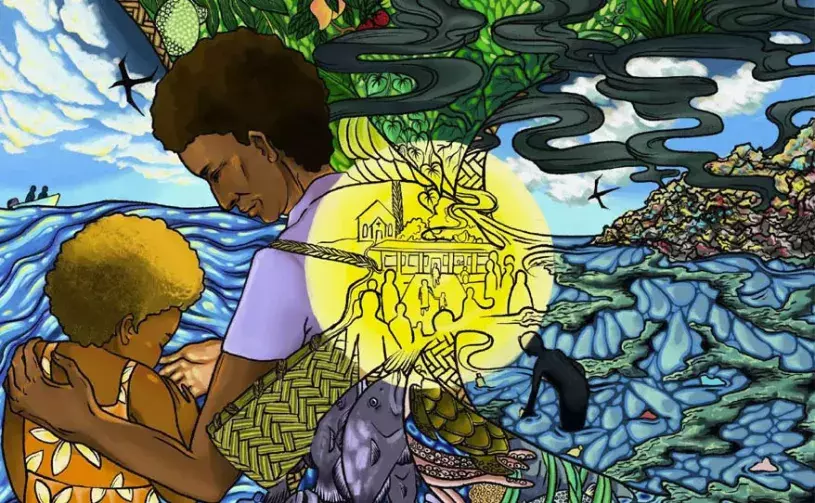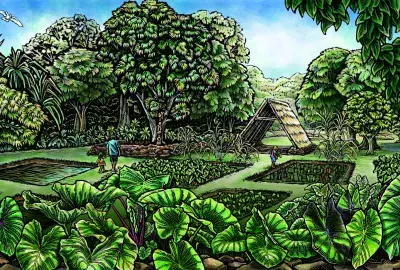Error message

This report is a culmination of a year’s worth of research and fieldwork which examines the impacts of plastic pollution on Indigenous communities in Fiji, blending Indigenous knowledge systems with modern research methods to address environmental equity and sustainability and recommend solutions for improved waste management.
The report primarily discusses the complex and multifaceted impacts of plastic pollution on Indigenous communities, with a focus on three case study locations in Fiji. It examines plastic pollution through the critical lenses of equity (distributional, procedural, recognitional, and contextual). The report analyses the effects of plastic pollution through different facets of equity—how plastic pollution’s burden is disproportionately borne by Indigenous communities and how equitable solutions must account for the distribution of resources, decision-making processes, recognition of Indigenous knowledge and practices, and contextual solutions tailored to specific community circumstances.

The discussion delves into how plastic pollution degrades the natural environment and hinders traditional practices, livelihoods, and cultural heritage—especially where communities have deeply rooted connections with their land and ocean. Against the backdrop of these challenges, the report documents various community-led efforts to combat plastic pollution, from developing innovative waste management strategies to reviving traditional practices that contribute to environmental sustainability. These include initiatives for waste reduction, upcycling, repurposing, and partnerships with external organizations to improve waste management infrastructure.
The report suggests that addressing plastic pollution requires comprehensive strategies that include national and municipal policies to reduce plastic usage, improve waste management, support Indigenous knowledge systems, and enhance community participation in decision-making. It emphasizes the need for global cooperation to tackle the issue of transboundary plastic pollution and for fair decision-making processes that incorporates the perspectives and wisdom of Indigenous peoples in environmental stewardship.
This report is an important contribution for the Fiji and provides invaluable insights that are necessary to inform national and regional policy frameworks or commitments that seeks to address the full lifecycle of plastic pollution, including in the marine environment.
Rufino Varea is pursuing a PhD in Marine Science at the University of the South Pacific and serves as a research fellow with the Pacific islands Development Program under the Asian Development Bank’s Development Research for Oceania Pipeline (ADB-DROP) Program.
The views expressed in this publication are those of the author(s) and do not necessarily reflect the policies or positions of the Pacific Islands Development Program or the East-West Center.
This report is a culmination of a year’s worth of research and fieldwork which examines the impacts of plastic pollution on Indigenous communities in Fiji, blending Indigenous knowledge systems with modern research methods to address environmental equity and sustainability and recommend solutions for improved waste management.
The report primarily discusses the complex and multifaceted impacts of plastic pollution on Indigenous communities, with a focus on three case study locations in Fiji. It examines plastic pollution through the critical lenses of equity (distributional, procedural, recognitional, and contextual). The report analyses the effects of plastic pollution through different facets of equity—how plastic pollution’s burden is disproportionately borne by Indigenous communities and how equitable solutions must account for the distribution of resources, decision-making processes, recognition of Indigenous knowledge and practices, and contextual solutions tailored to specific community circumstances.

The discussion delves into how plastic pollution degrades the natural environment and hinders traditional practices, livelihoods, and cultural heritage—especially where communities have deeply rooted connections with their land and ocean. Against the backdrop of these challenges, the report documents various community-led efforts to combat plastic pollution, from developing innovative waste management strategies to reviving traditional practices that contribute to environmental sustainability. These include initiatives for waste reduction, upcycling, repurposing, and partnerships with external organizations to improve waste management infrastructure.
The report suggests that addressing plastic pollution requires comprehensive strategies that include national and municipal policies to reduce plastic usage, improve waste management, support Indigenous knowledge systems, and enhance community participation in decision-making. It emphasizes the need for global cooperation to tackle the issue of transboundary plastic pollution and for fair decision-making processes that incorporates the perspectives and wisdom of Indigenous peoples in environmental stewardship.
This report is an important contribution for the Fiji and provides invaluable insights that are necessary to inform national and regional policy frameworks or commitments that seeks to address the full lifecycle of plastic pollution, including in the marine environment.
Rufino Varea is pursuing a PhD in Marine Science at the University of the South Pacific and serves as a research fellow with the Pacific islands Development Program under the Asian Development Bank’s Development Research for Oceania Pipeline (ADB-DROP) Program.
The views expressed in this publication are those of the author(s) and do not necessarily reflect the policies or positions of the Pacific Islands Development Program or the East-West Center.




